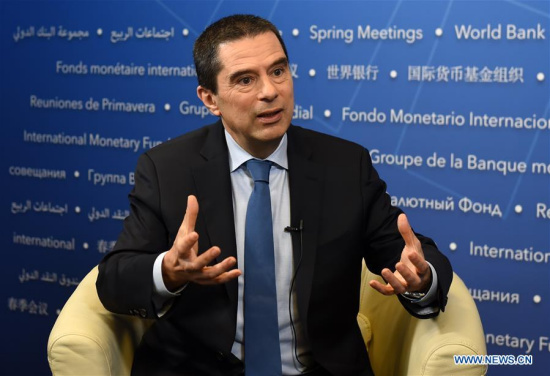
Vitor Gaspar, director of the International Monetary Fund (IMF) Fiscal Affairs Department, speaks during an interview with Xinhua News Agency in Washington D.C., the United States, April 19, 2017. (Xinhua/Bao Dandan)
Fiscal policy has a bigger role to play in promoting more sustainable and inclusive growth in China, a senior official of the International Monetary Fund (IMF) said on Wednesday.
Following decades of fast growth, the Chinese economy is "undergoing a very profound broad transformation," said Vitor Gaspar, director of the IMF Fiscal Affairs Department, noting the country is rebalancing the growth model from manufacturing to services, from investment to consumption, and from exports to domestic demand.
Going forward, "what is key is to guarantee that China continues on a sound and sustainable growth path," Gaspar told Xinhua in an interview on the sidelines of the Spring Meetings of the IMF and the World Bank, adding that fiscal policy could help facilitate China's economic transition.
"It can help for example by being inclusive, by trying to protect the segments of the Chinese population that are not benefiting as much as others from the benefits from the very fast growth that China is enjoying," he said.
"That can be done on the expenditure side of the budget through social spending and on the revenue side of the budget through increases in the progressivity of taxation," he explained.
China has realized very early on in the process of economic transformation that tax capacity is a fundamental pillar to build on state capacity and it has always regarded tax policy and revenue administration as part of the overall strategy, said the IMF official.
Citing China's nationwide value added tax (VAT) reform, Gaspar said the progress China has achieved so far in tax reforms is "really impressive" and "should not be underestimated," as the VAT is a crucial element of a modern tax system that China has already in place.
However, there's room for tax policy to support inclusive growth in China by being "more progressive" and "more redistributed" going forward, he said.
In terms of government debt risks, Gaspar said China's public debt levels are relatively low by international standards. If some investment activities which are off-budget were taken into account, the augmented government debt level would be higher, reaching about 60 percent of China's gross domestic product (GDP).
But in contrast with what is prevailing in most emerging market economies, he noted, the net worth of the general government in China is positive, which means the financial assets are in excess of the financial liabilities.
Therefore, "I don't think that China has any issue concerning debt sustainability. On the contrary, the fiscal position is sufficiently comfortable," Gaspar said, adding that China has "fiscal firepower" to do whatever it decides to do in terms of management of the debt and credit growth risks.
"What we emphasize is the earlier that is done, the better the prospect for sustainable growth in the medium to long run and the lower the risks around that path, even if in the short run that adjustment may have short-run costs," he said.
The IMF has been collaborating with the Chinese Ministry of Finance on a number of areas over past several years, including public financial management, cash management, the management of debt in sub-national governments and how to implement the budget law, according to Gaspar.
In its flagship Fiscal Monitor report released Wednesday, the IMF also highlighted a bigger role of fiscal policy to foster global growth, as policymakers and researchers are realizing that the fiscal tool kit is broader and its tools more powerful than they previously thought.
The report put forward five key guiding principles for member countries to smartly use fiscal policy to achieve more policy objectives, noting that fiscal policy should be countercyclical, growth-friendly, inclusive, solidly grounded in tax capacity, and be conducted with prudence.


















































